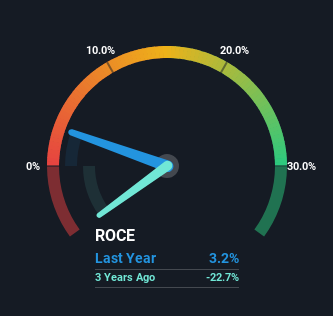The Returns On Capital At Southwest Airlines (NYSE:LUV) Don't Inspire Confidence
What trends should we look for it we want to identify stocks that can multiply in value over the long term? Firstly, we'd want to identify a growing return on capital employed (ROCE) and then alongside that, an ever-increasing base of capital employed. Ultimately, this demonstrates that it's a business that is reinvesting profits at increasing rates of return. In light of that, when we looked at Southwest Airlines (NYSE:LUV) and its ROCE trend, we weren't exactly thrilled.
Return On Capital Employed (ROCE): What Is It?
For those who don't know, ROCE is a measure of a company's yearly pre-tax profit (its return), relative to the capital employed in the business. To calculate this metric for Southwest Airlines, this is the formula:
Return on Capital Employed = Earnings Before Interest and Tax (EBIT) ÷ (Total Assets - Current Liabilities)
0.032 = US$770m ÷ (US$36b - US$12b) (Based on the trailing twelve months to March 2024).
So, Southwest Airlines has an ROCE of 3.2%. Ultimately, that's a low return and it under-performs the Airlines industry average of 9.0%.
See our latest analysis for Southwest Airlines
Above you can see how the current ROCE for Southwest Airlines compares to its prior returns on capital, but there's only so much you can tell from the past. If you'd like to see what analysts are forecasting going forward, you should check out our free analyst report for Southwest Airlines .
How Are Returns Trending?
In terms of Southwest Airlines' historical ROCE movements, the trend isn't fantastic. To be more specific, ROCE has fallen from 17% over the last five years. On the other hand, the company has been employing more capital without a corresponding improvement in sales in the last year, which could suggest these investments are longer term plays. It may take some time before the company starts to see any change in earnings from these investments.
In Conclusion...
Bringing it all together, while we're somewhat encouraged by Southwest Airlines' reinvestment in its own business, we're aware that returns are shrinking. Since the stock has declined 42% over the last five years, investors may not be too optimistic on this trend improving either. Therefore based on the analysis done in this article, we don't think Southwest Airlines has the makings of a multi-bagger.
If you'd like to know more about Southwest Airlines, we've spotted 3 warning signs, and 1 of them is a bit unpleasant.
If you want to search for solid companies with great earnings, check out this free list of companies with good balance sheets and impressive returns on equity.
Have feedback on this article? Concerned about the content? Get in touch with us directly. Alternatively, email editorial-team (at) simplywallst.com.
This article by Simply Wall St is general in nature. We provide commentary based on historical data and analyst forecasts only using an unbiased methodology and our articles are not intended to be financial advice. It does not constitute a recommendation to buy or sell any stock, and does not take account of your objectives, or your financial situation. We aim to bring you long-term focused analysis driven by fundamental data. Note that our analysis may not factor in the latest price-sensitive company announcements or qualitative material. Simply Wall St has no position in any stocks mentioned.
Have feedback on this article? Concerned about the content? Get in touch with us directly. Alternatively, email editorial-team@simplywallst.com

 Yahoo Finance
Yahoo Finance 
